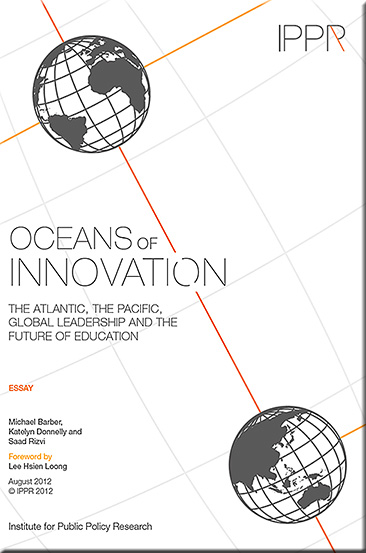Oceans of innovation: The Atlantic, the Pacific, global leadership and the future of education — from the Institute for Public Policy Research by Sir Michael Barber, Katelyn Donnelly and Saad Rizvi; with thanks to Stephen Harris (@Stephen_H) for posting this on Twitter
Description (emphasis DSC):
‘The economic and educational achievements of the Pacific region in the past 50 years are spectacular – unprecedented in fact. They lay a foundation for the next 50 years – a much better foundation than exists in many Atlantic systems – but the mix of factors that brought those achievements will not be capable of meeting the challenge ahead.’
This long essay by Sir Michael Barber, Katelyn Donnelly and Saad Rizvi assumes the near certainty that the Pacific region will take primary leadership of the global economy in the near future and explores the implications for their education systems, calling for a ‘whole-system revolution’ in the structure and priorities of teaching and learning in the region.
‘What is clear, though, is that education – deeper, broader and more universal – has a significant part to play in enabling humanity to succeed in the next half century. We need to ensure that students everywhere leave school ready to continue to learn and adapt, ready to take responsibility for their own future learning and careers, ready to innovate with and for others, and to live in turbulent, diverse cities. We need perhaps the first truly global generation; a generation of individuals rooted in their own cultures but open to the world and confident of their ability to shape it.
‘The growing pace of change and increasing complexity mean that global leadership will no longer be merely about summits behind closed doors. In an era of transparency, leaders will find themselves constantly in dialogue with those they purport to lead. Meanwhile, innovations which transform societies can and will happen anywhere. Leadership, in short, will be widely dispersed and will require increasing sophistication.’
From DSC:
Let’s help students identify, design, and develop their own businesses while they are still in K-20. We could provide them with mentoring, guidance, and teams of specialists from their “classmates” — wherever those classmates may be.
This business of studying for the standardized tests seems to fall far short of what the next generation will need to survive and thrive in the new global economy. With the dropout rates being what they are, it doesn’t appear that our current educational systems (at least in the U.S.) will get us to the place where our students are innovative, inventive, and are able to freelance with confidence — where they own their own learning, are engaged and motivated to learn, where they learn how to learn and know where to go to access the relevant streams of content that are flowing (constantly) by them. unleashed to be far more creative and entrepreneurial.
.









